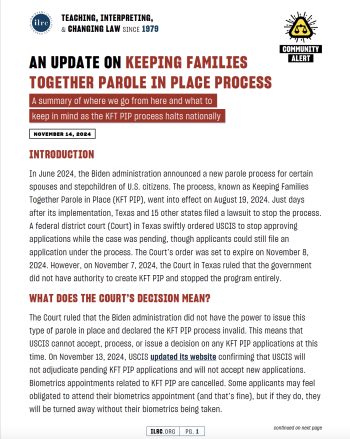Every family should have a family preparedness plan in case of an emergency. It is equally critical for immigrant families to think ahead and set more concrete plans for immigration-related emergencies that may arise.
To assist in this, we've created this toolkit that goes into detail about different childcare options available in case of an absent parent, how to find trusted immigration services in your community, and how to prepare to assert your constitutional rights in the presence of an immigration officer.
To assist in this, we've created this toolkit that goes into detail about different childcare options available in case of an absent parent, how to find trusted immigration services in your community, and how to prepare to assert your constitutional rights in the presence of an immigration officer.
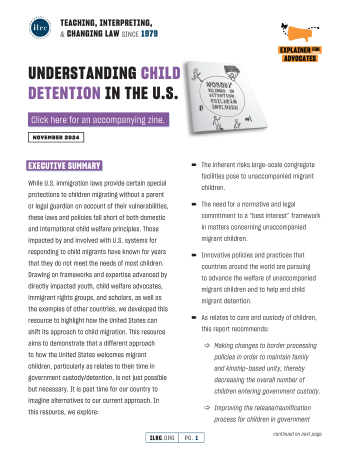
While U.S. immigration laws provide certain special protections to children migrating without a parent or legal guardian on account of their vulnerabilities, these laws and policies fall short of both domestic and international child welfare principles. Those impacted by and involved with U.S. systems for responding to child migrants have known for years that they do not meet the needs of most children. This resource aims to demonstrate that a different approach to how the United States welcomes migrant children, particularly as relates to their time in government custody/detention, is not just possible but necessary.
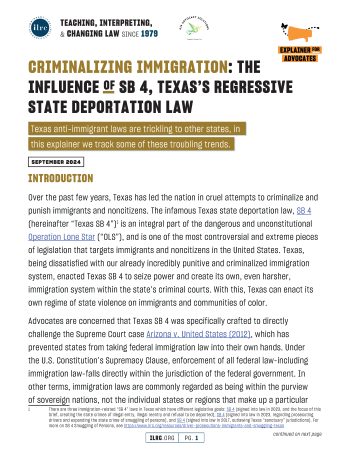
Over the past few years, Texas has led the nation in cruel attempts to criminalize and punish immigrants and noncitizens. The infamous Texas state deportation law, SB 4, is an integral part of the dangerous and unconstitutional Operation Lone Star and is one of the most controversial and extreme pieces of legislation that targets immigrants and noncitizens in the United States. In 2024, state legislatures across the country have proposed bills that further expand the already vast and punishing criminal-legal system by requiring local law enforcement to carry out federal immigration enforcement and creating new crimes that punish the act of crossing into a state without legal status. Unless stopped, Texas SB 4 and its ilk could herald a regressive wave of anti-immigrant state legislation that will endanger noncitizens and U.S. citizens across the country–to a greater extent than occurred in 2010 after the passage of Arizona’s infamous racial profiling law, SB 1070. This report looks at the copycat policies being put forth across the country.
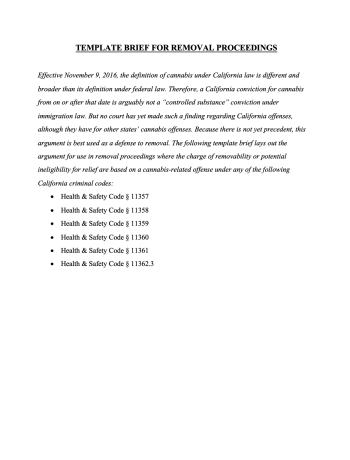
Since November 9, 2016, the definition of cannabis under California law is different and broader than the federal definition. Therefore, a California conviction for cannabis from on or after that date is arguably not a controlled substance conviction under federal immigration law. No court has yet made a finding on this issue for California offenses, but they have done so in other states with similar cannabis definitions. This template brief can be used to file a Motion to Terminate Proceedings or to file an Opposition to a Motion to Pretermit Proceedings (where the client is applying for adjustment of status or for cancellation of removal) to argue that any California cannabis conviction entered on or after November 9, 2016, is not a federal controlled substance offense.
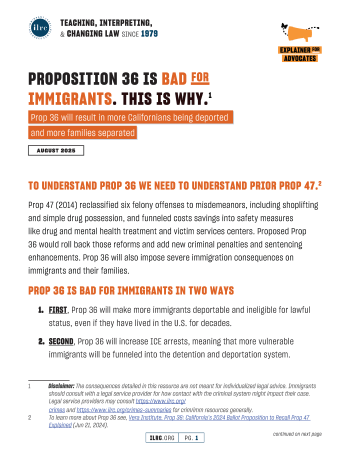
Prop 47 (2014) reclassified six felony offenses to misdemeanors, including shoplifting and simple drug possession, and funneled costs savings into safety measures like drug and mental health treatment and victim services centers. Proposed Prop 36 (November 2024) would roll back those reforms and add new criminal penalties and sentencing enhancements. Prop 36 will also impose severe immigration consequences on immigrants and their families. It will result in more Californians being deported and more families being separated. This resource provides some of the specific examples of the ways in which Proposition 36 will harm immigrants if passed.
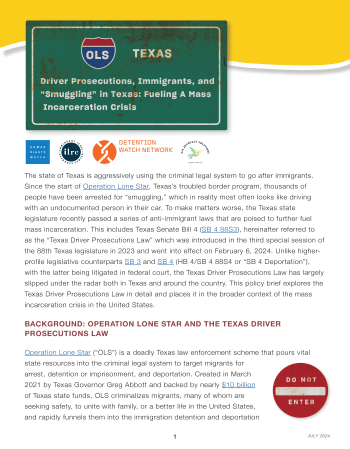
Texas authorities have expansively interpreted a 2024 law that imposes a 10-year mandatory minimum sentence on people convicted under the state's smuggling law to include giving rides to undocumented people, The Immigrant Legal Resource Center (ILRC), Human Rights Watch (HRW), Detention Watch Network (DWN), and AJA Advocacy Solutions said this report highlighting the law’s harm. The brief states that most people prosecuted for smuggling in Texas are young US citizens. Texas law enforcement officers have a troubled track record with identifying alleged smugglers, and now the state has raised the stakes of each arrest significantly.
The U.S. immigration system treats children and young people differently than adults. It is important to understand how your age may impact your options for seeking relief or protection against deportation. This Community Explainer highlights how age impacts eligibility for certain forms of immigration relief, how immigrant youth can help themselves and their family members, and how to learn more.
On August 30, 2022, the Biden Administration issued a new rule on Deferred Action for Childhood Arrivals (DACA) that incorporates DACA into the Federal Regulations, a process that serves to codify the program into law. Since its announcement, there have been several questions around who can access DACA now and what it means for all those first-time applicants who are waiting to obtain DACA. This Community Explainer details how the rule impacts current DACA recipients, how ongoing court battles affect how DACA is implemented, and more.
